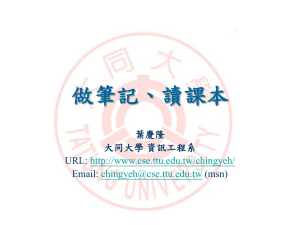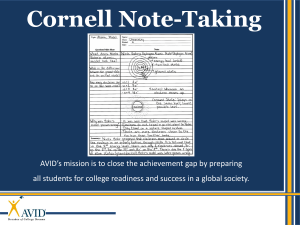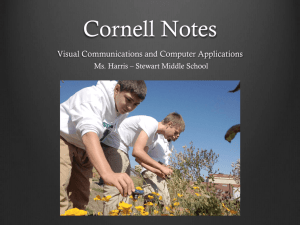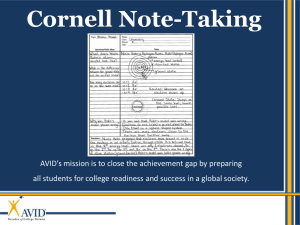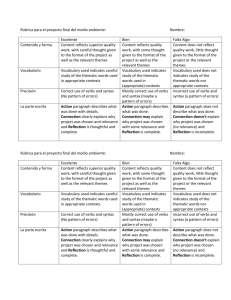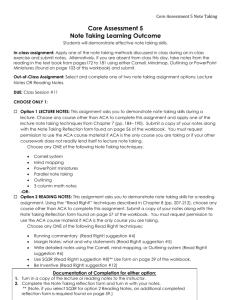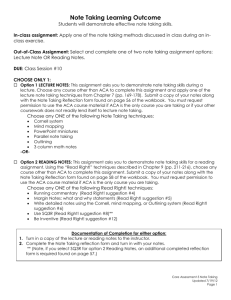Document
advertisement
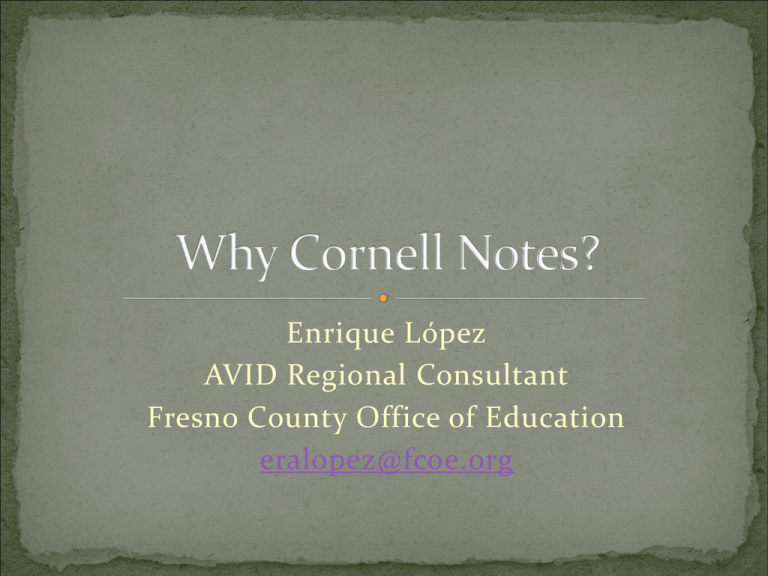
Enrique López AVID Regional Consultant Fresno County Office of Education eralopez@fcoe.org When a teachers says, “Write this down,” “This is important…,” or “This will be on the test.” The information is written on the whiteboard. Traditional Cornell Notes of you remember 100% of what you learned from first period? Ever hear of the Forgetting Curve? Learning recall How many 50 % 0% Number of days following learning Who created Cornell Notes? Dr. Walter Pauk because he was frustrated that his students were failing his class. He was a professor at Cornell University in New York. Dr. Pauk conducted a series of studies on note-taking with his students and this is what he found: You retain _____% if you take no notes You retain _____% if you take some or fragmented notes You retain _____% if you take copious and thorough notes with thoughtful higher level questions and specific and direct summaries Which grade do you want? S T A R Set-up your paper, heading; name, date, class, Topic, page number Take notes in class; use abbreviations, symbols, pictures, text language, highlight, diagrams, numbers, different colors for questions and information, etc. Also, listen for important key information that is being said by picking-up on the teacher’s tone, volume, body language, etc. Apply your notes to your homework. Analyze your notes to develop higher level questions for true comprehension of your material. Ask lots of questions in class. Review and reflect/summarize your notes. Fill in the gaps that your notes may have. If needed, re-write your notes so that they are nice and legible when you’re studying. Who is Arthur Costa? Why is he important to you? He developed Costa’s Levels of Questioning. There are three levels of questioning: Level 1 questions use verbs such as: list, describe, define, state, and name; Level 2 questions use verbs such as: analyze, compare, contrast, examine, and classify; Level 3 questions use verbs such as: hypothesize, predict, speculate, design, and evaluate. Level 1 Level 2 Level 3 Name two of the characters in Romeo and Juliet. Who is the author Of Mice and Men? Compare Cinderella to Snow White. In Shakespeare’s “Julius Caesar,” how do Brutus’ murderous actions personify dramatic irony? If Lenny, from Of Mice and Men, would have lived, what would his life be like? What would the Roman Empire be like if Julius Caesar had not been murdered? Open-ended questions Close-ended questions Opinion questions Have “unlimited” responses, like essay questions. These are best for tutorials Have pre-set answers, like multiple choice, true/false, and yes/no. These questions show up on tests, surveys, and forms Use level three verbs when writing opinion questions for tutorials. Opinion questions should be thoughtful enough to focus the discussion and reach a higher level of analysis. Step 1 Highlight, circle, or underline things that Step 2 Generate questions based on your review Step 3 Create summary/reflection on your you may have questions about or don’t understand. for each information chunk thought process or learning. Summary A good summary is a truncated statement of the entire lesson, learning, and or material that was covered. Examples: The main points from notes are… The proper steps to solve an ______ equation are…. The three most important facts from today’s lesson are… The difference between _______ and ______ are… Reflection A reflection states how the learner will begin to use what they learned and apply it to their other classes and life. Examples: The reason I had to learn about _____ is because Now that I know how to ______ I can fully understand ______ how this relates to______ I want to be successful as a student, knowing how to______ is not only relevant to ______ but also to______. Write a reflection from first period. Write a summary about this lesson. Write a reflection about Cornell Notes. Have fun taking Cornell Notes in all of your classes. Thank you!

